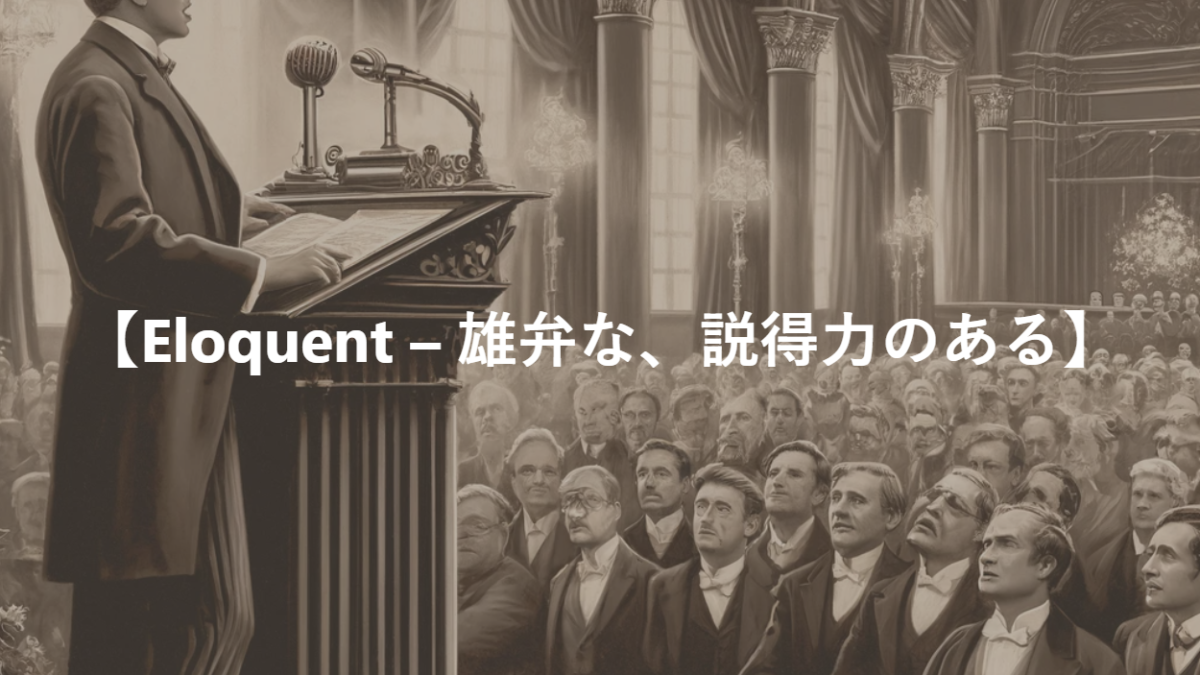語源・類義語・反対語・例文
【Eloquent – 雄弁な、説得力のある】という単語の語源とか由来を知っていますか?
「Eloquent」(雄弁な、説得力のある)という単語は、ラテン語の「eloquentia」から来ています。これは「eloqui」という動詞から派生しており、「話す」や「表現する」という意味です。したがって、「Eloquent」の語源的な意味は、話すことや表現することに関連しており、特に魅力的で説得力があり、影響力のある話し方を指します。
この単語は、古典期のローマで修辞学と密接に関連していたため、話術や演説の技術に優れた人、つまり聞き手に強い印象を与え、感動させることができる人を指して使用されていました。中世から近代にかけて、英語に取り入れられた際にも、この「雄弁さ」や「説得力のある表現力」を持つ人を指す言葉として定着しました。
現代英語では、「Eloquent」は話し言葉だけでなく、書かれた言葉に対しても使用され、その人の言葉が聞き手や読み手の感情や理解に深く訴えかける能力を賞賛する際に用いられます。
The word “Eloquent” originates from the Latin “eloquentia,” which is derived from the verb “eloqui,” meaning “to speak” or “to express.” Therefore, the etymological meaning of “Eloquent” is associated with speaking or expressing, particularly referring to a manner of speaking that is appealing, persuasive, and influential.
This term was closely associated with rhetoric in classical Rome, used to describe a person with excellent skills in oratory or public speaking, namely someone who can make a strong impression on and evoke emotion in the listener. As the word was adopted into English from the medieval to the modern period, it continued to denote individuals possessing “eloquence” or persuasive expressiveness.
In contemporary English, “Eloquent” is used not only for spoken but also for written words, employed to commend the ability of a person’s words to deeply appeal to the emotions or understanding of the listener or reader.
この単語の類義語・反対語を教えてください。
類義語
- Articulate – 明確に表現する
- 考えや感情をはっきりと伝える能力があること。
- Persuasive – 説得力がある
- 相手を説得する力がある、効果的に自分の立場を伝える能力。
- Rhetorical – 修辞的な
- 効果的な話術や文章技術を使い、聴衆を引きつけること。
- Expressive – 表現豊かな
- 感情や考えを豊かに表現すること。
- Fluent – 流暢な
- 滑らかで途切れることなく話すこと。
反対語
- Inarticulate – 不明瞭な
- 考えや感情をはっきりと伝えることができないこと。
- Unconvincing – 説得力がない
- 相手を納得させることができない、説得力に欠けること。
- Tongue-tied – 言葉に詰まる
- 緊張や戸惑いからスムーズに話すことができない状態。
- Inexpressive – 表情に乏しい
- 感情や考えを表現する力が乏しいこと。
- Hesitant – ためらう
- 不確かで自信がなく、明確な表現に欠けること。
似た単語で間違いやすい単語はありますか?
- Eloquence – 雄弁
- 「Eloquent」の名詞形で、雄弁さや説得力のある表現力を意味します。「Eloquent」が形容詞として個人の特性を表すのに対し、「Eloquence」はその能力や特性自体を指します。
- Fluency – 流暢さ
- 言語を滑らかに、途切れることなく話す能力を指します。「Eloquent」と混同されることがありますが、「Fluency」は言語の流暢さに重点を置き、「Eloquent」は内容の説得力や感情表現の豊かさに重点を置きます。
- Rhetoric – 修辞学、雄弁術
- 効果的な話術や文章術を研究する学問、またはその技術自体を指します。「Eloquent」とは密接に関連していますが、「Rhetoric」は技術や方法論に焦点を当て、より広範な学問的なコンテキストで使用されます。
- Oratory – 雄弁術、演説術
- 公衆の前で効果的に話す技術や芸術を指します。「Eloquent」と同様に説得力のある話し方を意味しますが、「Oratory」は特に公的なスピーチや演説に焦点を当てた言葉です。
Eloquentという単語を使った例文をいくつか教えてください
Martin Luther King Jr.’s speeches were known for their eloquence and power, and helped to inspire the civil rights movement.
(マーティン・ルーサー・キング・ジュニア氏のスピーチは、雄弁さと力強さで知られ、市民権運動を促進するのに役立ちました。)
The candidate’s eloquent speech won over many undecided voters and helped to secure his victory in the election.
(候補者の雄弁なスピーチが多くの未決定の有権者を味方につけ、選挙での勝利を確実にしました。)
The author’s eloquent writing style was praised for its vivid imagery and emotional depth.
(著者の雄弁な文章スタイルは、生き生きとしたイメージと感情の深さで称賛されました。)
The lawyer’s eloquent argument in court helped to persuade the judge and secure his client’s acquittal.
(弁護士の雄弁な主張が裁判官を説得し、クライアントの無罪判決を確保するのに役立ちました。)
【Eloquent – 雄弁な、説得力のある】のコロケーション
- Eloquent speaker (雄弁な話し手): 話し手が非常に説得力があり、聞き手を惹きつける能力があることを指します。この人物は、アイデアや感情を効果的に伝えることができます。
- Eloquent speech (雄弁なスピーチ): スピーチや演説が聞き手に強い印象を与え、メッセージを明確に伝える能力がある場合に使われます。このようなスピーチは通常、感情的に訴えかける要素を含んでいます。
- Eloquent writing (雄弁な文章): 書かれた言葉が説得力があり、読者に深い影響を与えることを指します。雄弁な文章は、論理的でありながら感情を刺激することが多いです。
- Eloquent expression (雄弁な表現): 個人が考えや感情を表現する際に、非常に説得力があり、感情的に訴えかける方法を指します。この表現は、人々の心を動かす力があります。
- Eloquent silence (雄弁な沈黙): 何も言わないことが、言葉以上の意味を持つ状況を指します。沈黙自体が強いメッセージを伝え、感情的な影響を与えることがあります。
「Eloquent」は、人や文章が持つ説得力や表現力を強調する英単語です。この単語を使用する一般的なシチュエーションについて解説します。
まず、「Eloquent speaker」は、その話術によって聞き手を魅了し、説得することができる人を指します。このような話し手は、自分の考えや感情を効果的に伝える能力を持っており、リスナーに深い印象を与えることができます。
次に、「Eloquent speech」は、感情的に人々に訴えかけ、明確なメッセージを伝えるスピーチや演説を意味します。このようなスピーチは、聞き手の心に深く響き、長く記憶に残るものです。
「Eloquent writing」は、文章が持つ説得力や感情的な影響を指します。雄弁な文章は、読者を惹きつけ、考えや感情を伝える上で非常に効果的です。論理的かつ感情的な要素を組み合わせることで、読者の心を動かします。
「Eloquent expression」では、個人が自らの考えや感情を非常に説得力のある、感動的な方法で表現する様子を示します。この表現力は、他者の感情に訴え、心を変える力を持っています。
最後に、「Eloquent silence」は、沈黙が強いメッセージを伝える状況を表します。この場合、何も言わないこと自体が深い意味を持ち、聞き手に強い感情的な影響を与えることがあります。
これらの例を通じて、「Eloquent」が使われる文脈を理解できます。この単語は、人々を動かす力があるスピーチ、文章、表現を指す際に頻繁に使用される言葉です。
“Eloquent” is an English word that emphasizes the persuasive power and expressiveness of a person or piece of writing. Let’s explore common situations where this term is used.
First, an “Eloquent speaker” refers to a person who, through their oratory skills, can captivate and persuade the audience. Such speakers have the ability to effectively communicate their ideas and emotions, leaving a lasting impression on the listener.
Next, “Eloquent speech” denotes a speech or address that emotionally appeals to people and conveys a clear message. This kind of speech resonates deeply with the audience and remains memorable for a long time.
“Eloquent writing” refers to the persuasive and emotional impact of written words. Eloquent prose attracts readers and conveys thoughts and feelings effectively. By combining logical and emotional elements, it has the power to move the reader’s heart.
“Eloquent expression” illustrates how individuals can express their thoughts and feelings in a very convincing and moving manner. This expressive ability appeals to the emotions of others and has the power to change hearts.
Lastly, “Eloquent silence” describes situations where silence conveys a profound message. In this context, the act of saying nothing itself carries deep significance and can have a strong emotional effect on the listener.
Through these examples, we can understand the contexts in which “Eloquent” is used. It is a term frequently employed to describe speeches, writings, or expressions that have the power to move people.
文法問題
問題 1
Which of the following sentences uses the word “eloquent” correctly?
- a) His eloquent was very high, and he scored well in the exam.
- b) She gave an eloquent speech that moved the audience to tears.
- c) The eloquent of the painting was remarkable.
- d) They found his argument to be eloquent than hers.
正解: b) She gave an eloquent speech that moved the audience to tears.
解説:
- a) “His eloquent was very high”は文法的に間違っています。”eloquent”は形容詞であり、名詞のように使うことはできません。
- b) “She gave an eloquent speech”は正しい文です。”eloquent”は形容詞として”speech”(演説)を修飾しており、「彼女は聴衆を感動させる雄弁な演説を行った」という意味です。
- c) “The eloquent of the painting”も文法的に間違っています。ここでは”eloquence”(名詞)を使うべきです。
- d) “eloquent than hers”は比較級の形で使うのは間違っています。比較級には”more eloquent than”を使います。
問題 2
Choose the sentence that best describes someone being “eloquent.”
- a) He stumbled over his words and struggled to convey his message.
- b) She spoke with such clarity and passion that everyone was captivated.
- c) He preferred to stay silent during the meeting.
- d) She read her speech from a paper without any emotion.
正解: b) She spoke with such clarity and passion that everyone was captivated.
解説:
- a) “He stumbled over his words”(彼は言葉に詰まり、メッセージを伝えるのに苦労した)は、雄弁ではありません。
- b) “She spoke with such clarity and passion”(彼女は非常に明瞭かつ情熱的に話した)は、まさに”eloquent”(雄弁な)の定義に合致します。
- c) “He preferred to stay silent”(彼は会議中に黙っていることを好んだ)は雄弁ではありません。
- d) “She read her speech from a paper without any emotion”(彼女は感情を込めずに紙から演説を読んだ)は雄弁ではありません。
問題 3
Fill in the blank with the correct form of the word “eloquent”:
- The politician’s __ during the debate earned him a lot of supporters.
- a) eloquence
- b) eloquently
- c) eloquent
- d) eloquents
正解: a) eloquence
解説:
- a) “eloquence”(雄弁さ)は名詞であり、文の中で名詞の位置にあります。「政治家の雄弁さが彼に多くの支持者をもたらした」という意味です。
- b) “eloquently”(雄弁に)は副詞であり、ここでは使えません。
- c) “eloquent”(雄弁な)は形容詞であり、ここでは使えません。
- d) “eloquents”は文法的に存在しない単語です。
問題 4
Identify the sentence where “eloquent” is used incorrectly:
- a) The teacher praised the student for his eloquent essay.
- b) Her eloquent dance moves impressed everyone at the show.
- c) His eloquent defense helped him win the case.
- d) The president is known for his eloquent speeches.
正解: b) Her eloquent dance moves impressed everyone at the show.
解説:
- a) “eloquent essay”(雄弁なエッセイ)は文法的に正しく、「教師は学生の雄弁なエッセイを称賛した」という意味です。
- b) “eloquent dance moves”は文法的に間違っています。”eloquent”は言葉や演説に対して使われる形容詞であり、ダンスの動きに使うのは適切ではありません。
- c) “eloquent defense”(雄弁な弁護)は文法的に正しく、「彼の雄弁な弁護が彼に勝利をもたらした」という意味です。
- d) “eloquent speeches”(雄弁な演説)は文法的に正しく、「大統領は雄弁な演説で知られている」という意味です。
問題 5
Which word can best replace “eloquent” in the following sentence without changing its meaning?
- “The lawyer’s eloquent argument convinced the jury of his client’s innocence.”
- a) brief
- b) clumsy
- c) persuasive
- d) quiet
正解: c) persuasive
解説:
- a) “brief”(簡潔な)は、”eloquent”(雄弁な)と同じ意味ではありません。
- b) “clumsy”(不器用な)は、”eloquent”の反対の意味です。
- c) “persuasive”(説得力のある)は、”eloquent”の意味に最も近いです。どちらも「人を納得させる力」を表現します。
- d) “quiet”(静かな)は、”eloquent”の意味とは全く異なります。

